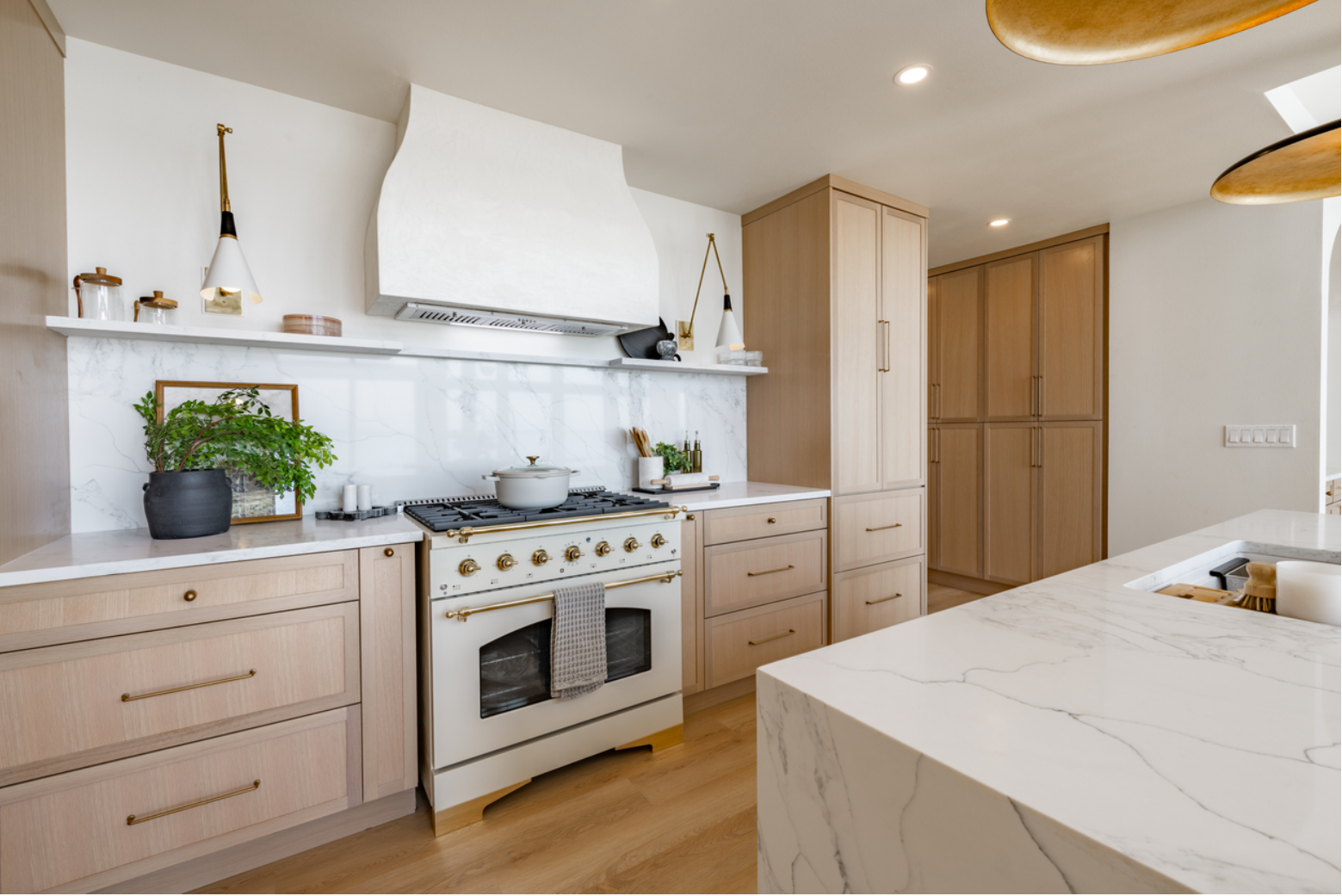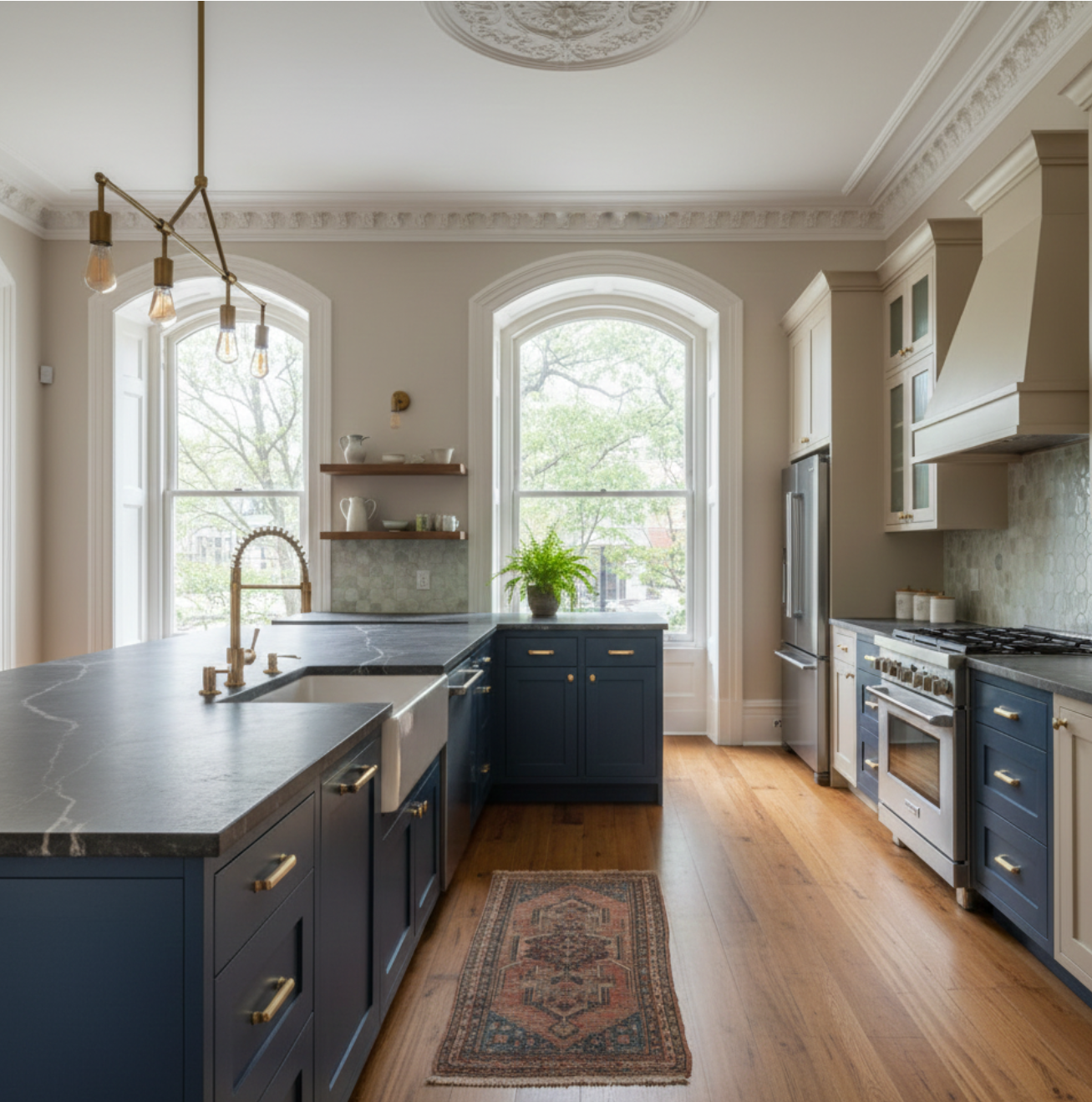
When it comes to choosing the right countertops for your kitchen or bathroom, it can be tough to decide between two of the most popular materials on the market: granite and quartz. Both materials have their own unique benefits and drawbacks, and making the right choice for your home will depend on your specific needs and preferences.
In this article, we will compare granite and quartz countertops in terms of their composition, durability, appearance, maintenance, and cost, to help you make an informed decision about which material is best for you. Whether you're a homeowner looking to update your kitchen or a designer searching for the perfect countertop material for a client's home, this comparison will provide you with all the information you need to make the right choice.
Let's begin with a basic understanding of quartz and granite.
Granite is a very hard natural stone. It is mined from quarries and then cut into sizeable slabs for use in countertops and other surfaces. It is given a finishing polish that makes it known for its beauty.
It is a widely known natural countertop material that serves as a great choice for homeowners. It offers numerous advantages and various drawbacks, which will be discussed in detail when analyzing the differences between granite and quartz.
Quartz, on the other hand, is a man-made material that is composed of natural quartz, pigments, and resins. Natural quartz accounts for 95 percent of quartz countertops, while pigments and resins make up the remaining 5 percent.
Quartz countertops are similarly a popular choice among homeowners.
Let us now compare granite and quartz countertops to better understand which is best.
Quartz countertops are low maintenance and only require occasional wiping with a damp cloth to keep them clean. They are also non-porous, which means they are resistant to bacteria and do not require sealing like granite countertops do.
Granite countertops, on the other hand, require more maintenance. They should be sealed every 1-2 years to protect the stone from stains. In addition, they should be cleaned with mild detergent and warm water. They should also be wiped dry to prevent water spots. Granite countertops are also prone to scratching, so it is important to use cutting boards and avoid placing heavy objects on the surface.
The cost of quartz countertops ranges from $50 to $100 per square foot installed, depending on the quality of the material and the complexity of the installation. Higher-quality quartz countertops and more complex installations will be more expensive.
The cost of granite countertops ranges from $40 to $200 per square foot installed, again depending on the quality of the material and the complexity of the installation. Higher-quality granite and more complex installations will be more expensive.
In general, quartz countertops tend to be more expensive than granite countertops.
Quartz is a man-made material that is composed of natural quartz, pigments, and resins. The natural quartz is ground into a fine powder and mixed with the pigments and resins to create a strong and durable material.
Granite, on the other hand, is a natural stone that is mined from quarries and then cut into slabs for use in countertops and other surfaces. It is composed of minerals, including feldspar, quartz, and mica, which give it its unique appearance and strength.
The main difference between quartz and granite countertops in terms of composition is that quartz is a man-made material and granite is a natural stone.
Quartz countertops come in a wide range of colors and patterns, including solid colors and marble-like patterns. They can be made to mimic the appearance of natural stone, including granite, marble, and even concrete. Quartz countertops are also available in a variety of edge styles, including square, beveled, and ogee, which allows you to customize the look of your countertops.
Granite countertops also come in a wide range of colors and patterns, including solid colors, speckled patterns, and veining. However, because granite is a natural stone, no two pieces are exactly the same, which adds to its natural beauty and uniqueness. Granite countertops are also available in a variety of edge styles, allowing you to customize the look of your countertops.
Quartz countertops are known for their durability and resistance to stains, scratches, and heat. They are also non-porous, which means they are resistant to bacteria and do not require sealing like granite countertops do. However, quartz countertops are prone to chipping and cracking if they are subjected to extreme force, although this is not a common occurrence.
Granite countertops are also known for their durability and resistance to scratches and heat. However, they are porous and require sealing to protect against stains, and they may be more prone to scratching than quartz countertops. In addition, granite is a heavy material and may require additional support, which can add to the cost of installation.
Quartz and granite countertops can both add value to your home, but they may have different effects on the resale value of your property.
Granite countertops are a popular choice among homebuyers and can add value to your home. They are considered high-end materials and can increase the perceived value of your home. In addition, granite countertops are durable and low maintenance, which can be appealing to potential buyers.
Quartz countertops are also a popular choice among homebuyers and can add value to your home. They are known for their durability and resistance to stains and scratches, which can be appealing to potential buyers. However, quartz countertops may not be considered as high-end as granite, which could potentially affect the resale value of your home.
In summary, both quartz and granite countertops can add value to your home, but the specific effect on resale value will depend on a variety of factors, including the overall condition of your home, the quality of the material, and the preferences of potential buyers. It is always a good idea to consult with a real estate professional or appraiser for specific advice on the resale value of your home.
There is no one "best" countertop material that is right for everyone, as the choice between granite and quartz will depend on your specific needs and preferences. Both materials have their own unique benefits and drawbacks, as discussed above in the differences.
Making the right choice for your home will depend on your budget, style, and needs. It is always a good idea to weigh the pros and cons of each material before making a decision.
AP Marble & Granite has been in the market for over 20 years, and we carry a wealth of experience with regard to countertop materials. Our 40,000-square-foot showroom in Michigan continues to provide premier stone products that are sure to leave you happy and satisfied.
Visit our warehouse today to see why we house the perfect product for your next project, or contact us and we'll get right back to you.

Explore upcoming 2026 trends in natural stone countertops for Metro Detroit kitchens, including colors, textures and durable stone options.

Discover the top stone choices for remodeling historic Detroit homes. Learn how to match natural stone with original architecture and period details.